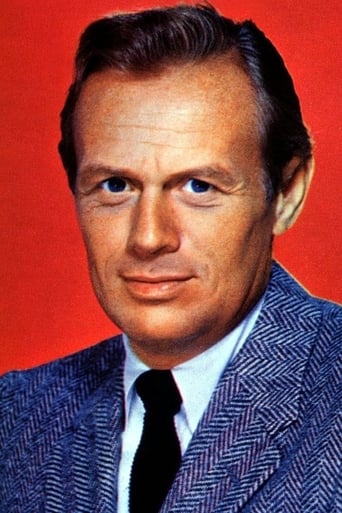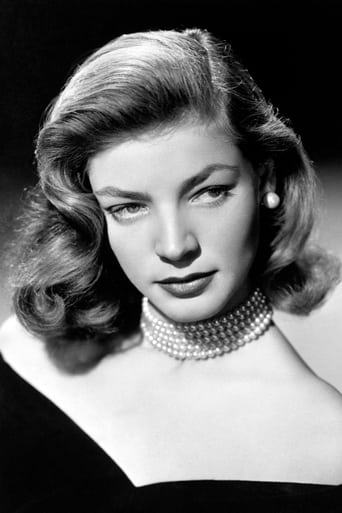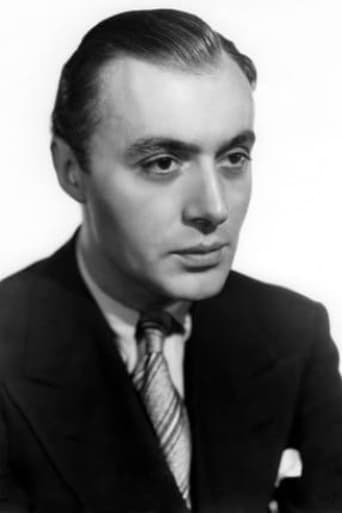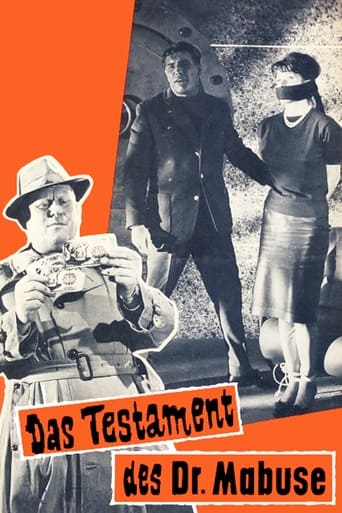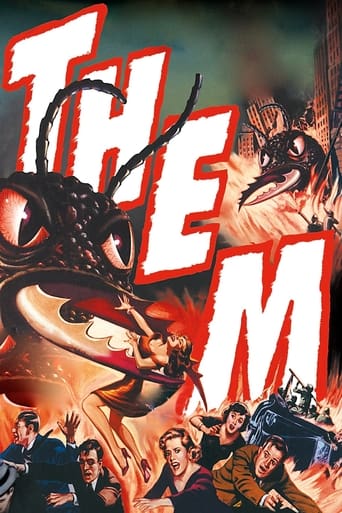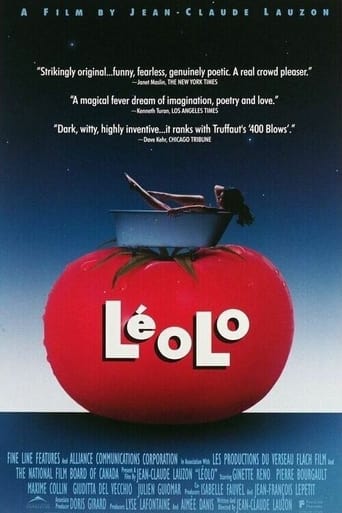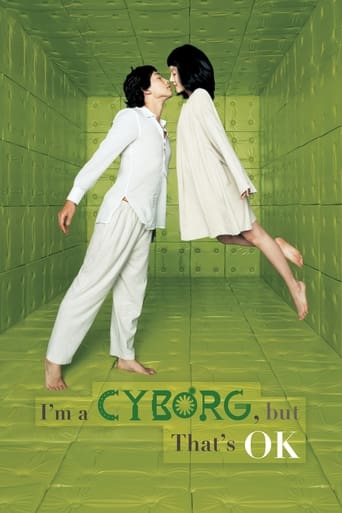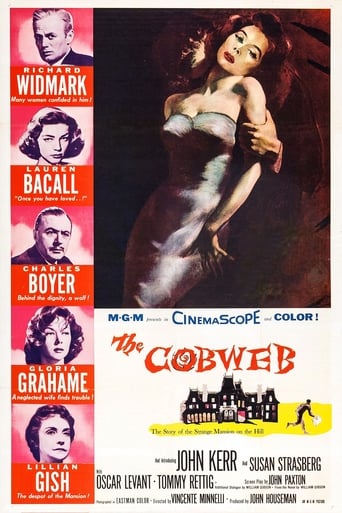
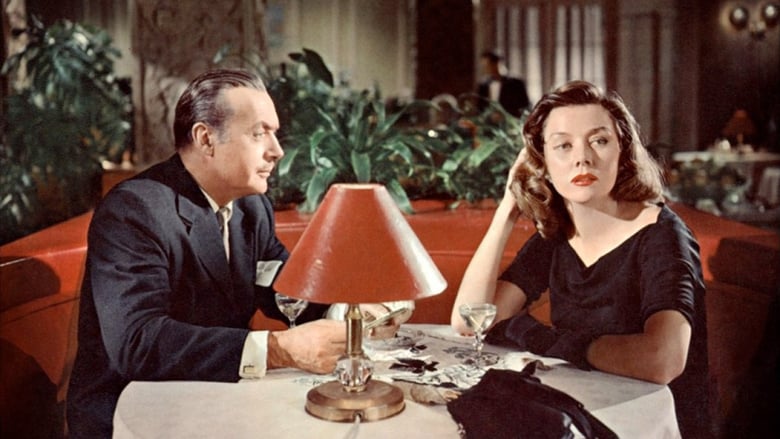
The Cobweb (1955)
Patients and staff at a posh psychiatric clinic clash over who chooses the clinic’s new drapes - but drapes are the least of their problems.
Watch Trailer
Cast
Similar titles
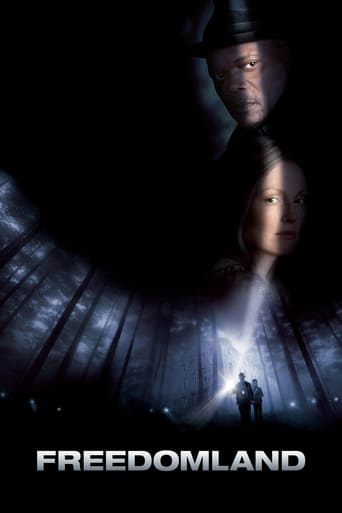
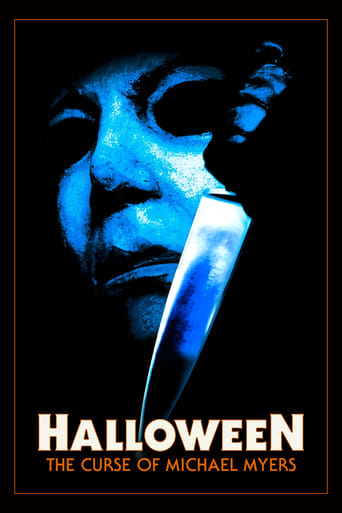
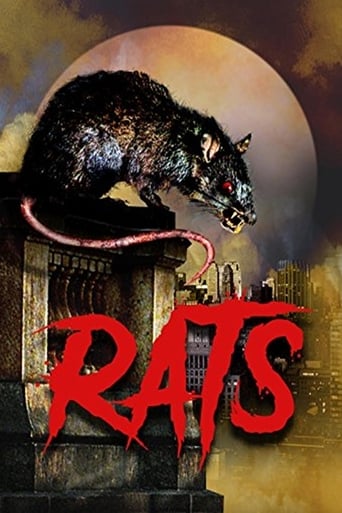
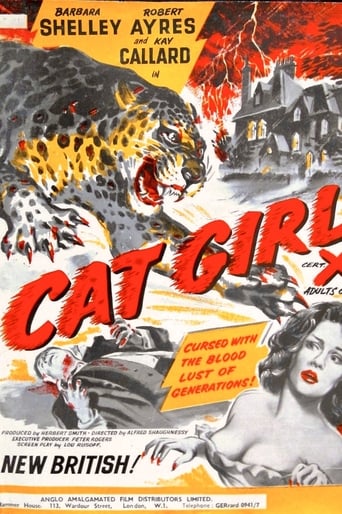
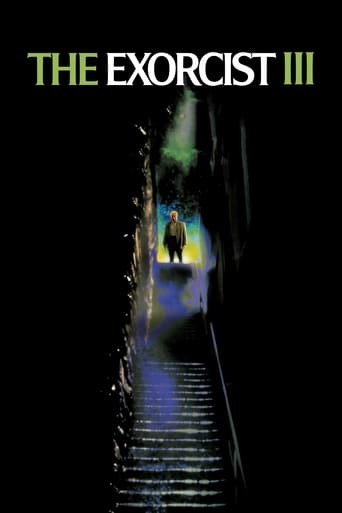

Reviews
Very very predictable, including the post credit scene !!!
Fanciful, disturbing, and wildly original, it announces the arrival of a fresh, bold voice in American cinema.
A movie that not only functions as a solid scarefest but a razor-sharp satire.
Blistering performances.
Copyright 1955 by Loew's Inc. New York opening at Loew's State: 5 August 1955. U.S. release: 15 July 1955. U.K. release: February 1956. Australian release: 24 October 1955. 11,125 feet. 124 minutes.SYNOPSIS: Tensions among the staff at a private mental clinic reach a crisis.NOTES: Film debuts of John Kerr and Susan Strasberg. Negative cost: approximately $2½ million. Initial domestic rentals gross: approx. $1½ million.COMMENT: The most difficult type of role to accomplish successfully, is one in which a person conceals his or her true character under a false personality. Players cast in such roles, are faced with quite a problem. They must act convincingly enough to dupe their fellow- players, and yet unconvincingly enough to reveal their true characters to the audience. There are many examples of outstanding portrayals of this kind — Pierre Blanchar in "Symphony Pastoral", Gloria Grahame in "Human Desire", Mary Murphy in "Hell's Island", Edmond O'Brien in "The Barefoot Contessa" (for which he deservedly won an Academy Award). The latest example is admirably executed by one of the world's foremost actors, Charles Boyer, in "The Cobweb".Boyer provides a fascinating study of a once-brilliant psychiatrist, now a deteriorated man. Nominal head of a clinic for nervous disorders, he hides his gross inefficiency, his moral corruption, his cowardice, his deception and his cunning, beneath a bogus charm. Ironically, by too zealous an application to his work, his own mind has become so warped, that besides wrecking his own life and that of his wife, he now begins to wreck the lives of the people he seeks to assist.Secretary of the Clinic, is Victoria Inch, a vain, insolent, brawling, commandeering, middle-aged spinster, determined to be on the winning side of any quarrel. Interested solely in herself, she has no regard whatever for the feelings of other people, least of all the patients in her care. This role is superbly portrayed by veteran, Lillian Gish.Oscar Levant is excellent in his characterization of a patient who discourages others, in order to increase his own sense of importance. Newcomer, John Kerr, either lacks experience or natural acting ability. His performance may depend entirely on the work of ace director, Vincente Minnelli.Minnelli has a flair for satirical character-sketches. That's why he excels in his treatment of Miss Inch. Watch out for the scene in her home, between herself and Richard Widmark. Notice, also, the talkative bore who makes a nuisance of himself at the patients' meetings, the two ambulance men on the river-bank, the loutish types in the picture-theater, etc.The film's only defect is its rather pat conclusion. All the plots are nicely straightened out to the complete satisfaction of the box- office. Even Miss Inch's heart is touched. In spite of this one shortcoming, the picture is nevertheless quite absorbing and certainly well worth seeing.
Like a roadside accident, it's difficult to turn away from this bizarre melodrama. Seriously, what were they smoking? The whole movie is like a Saturday Night Live skit that never ends. How was it possible for these actors and actresses to go onto the set each day without cracking up about the absurdity of this story? I suppose it was a different culture back then, but how did they not break down in laughter acting these parts? Or maybe they did. Everything is so completely over the top, the high pitched emotional performances, the strange sets and paintings on the walls, the saturated color and dramatic lighting. It's almost like this movie is taking place in a weird little world far away from the edge of the universe. My greatest disappointment is that the issue of the drapes was never resolved. Really a huge bummer, and it's probably what kept this movie from becoming an enormous hit.
In the 1950's, Vincente Minnelli was making some of the strongest films in Hollywood. Pictures like Some Came Running and The Bad and the Beautiful were very strong and probing studies of American life; The Cobweb deserves to be considered alongside these great films. The tranquil world of a psychiatric clinic in the Midwest countryside (somehow I can see cows in the fields even though there aren't any) is disrupted by a power struggle between two strong-willed men: Dr McIver, a young man whose first important post this is, and Dr Devanal, who has spent more than 20 years at the clinic and seems to be burnt-out. A stiff-necked spinster, Victoria Inch, whose father had created the clinic does everything she can to aggravate the principals. The clash between old settled practices and innovative new ones is the subject of the film.People fret about the drapes--well really they're only the trigger for the clash. I have the strong feeling that by leaving Chicago to settle in this back-water, McIver has made a mountain of trouble for himself. His wife Karen (splendid performance by Gloria Grahame) is experiencing severe boredom and frustration; she's a sensual romantic woman who is being ignored by her husband, who is trying to find romance with Meg Rinehart (a cool Lauren Bacall). The romantic disappointments of the main characters make this film work.
You can see what attracted Minnelli to this story, as it's partly about a conflict over decor. Maybe this worked in the novel, but it's hardly the stuff of compelling screen drama. Of course the choice of drapes is symbolic of independence to the patients, and symbolic of her power to Miss Inch, and it's actually a realistically mundane conflict such as might actually occur anywhere. It just seems to be much ado about nothing when it's acted out.Minnelli uses a bit of the soundtrack of Seven Brides For Seven Brothers, here (the picture that trumped his own Brigadoon at the box office) - in a scene at the movies. Guess he had no hard feelings.One of Minnelli's interesting misfires. Even though it doesn't really work, I've seen it three or four times.The acting is good, overall. Richard Widmark (as the director of the clinic) has two leading ladies, Lauren Bacall and Gloria Grahame. This is one of the few times I've ever really seen Grahame miscast. She had a wide range, after all she played everything from Violet Bick in It's A Wonderful Life, to Rosemary Bartlow in The Bad And The Beautiful, to Ado Annie in Oklahoma. But I think you will agree her role defeats her best efforts here. She starts out very well but I'm not sure I always understood where she was coming from as the film wore on. Bacall plays a simple, sensible girl, and does a good job. Lillian Gish plays the unpredictable Miss Inch, Charles Boyer the self-destructing Dr. Devanal, John Kerr the young and artistic Stevie (a role originally announced for James Dean). Oscar Levant is called upon to go outside his usual comfort zone and I'm not sure he makes it. Susan Strasburg is excellent in a small role.
